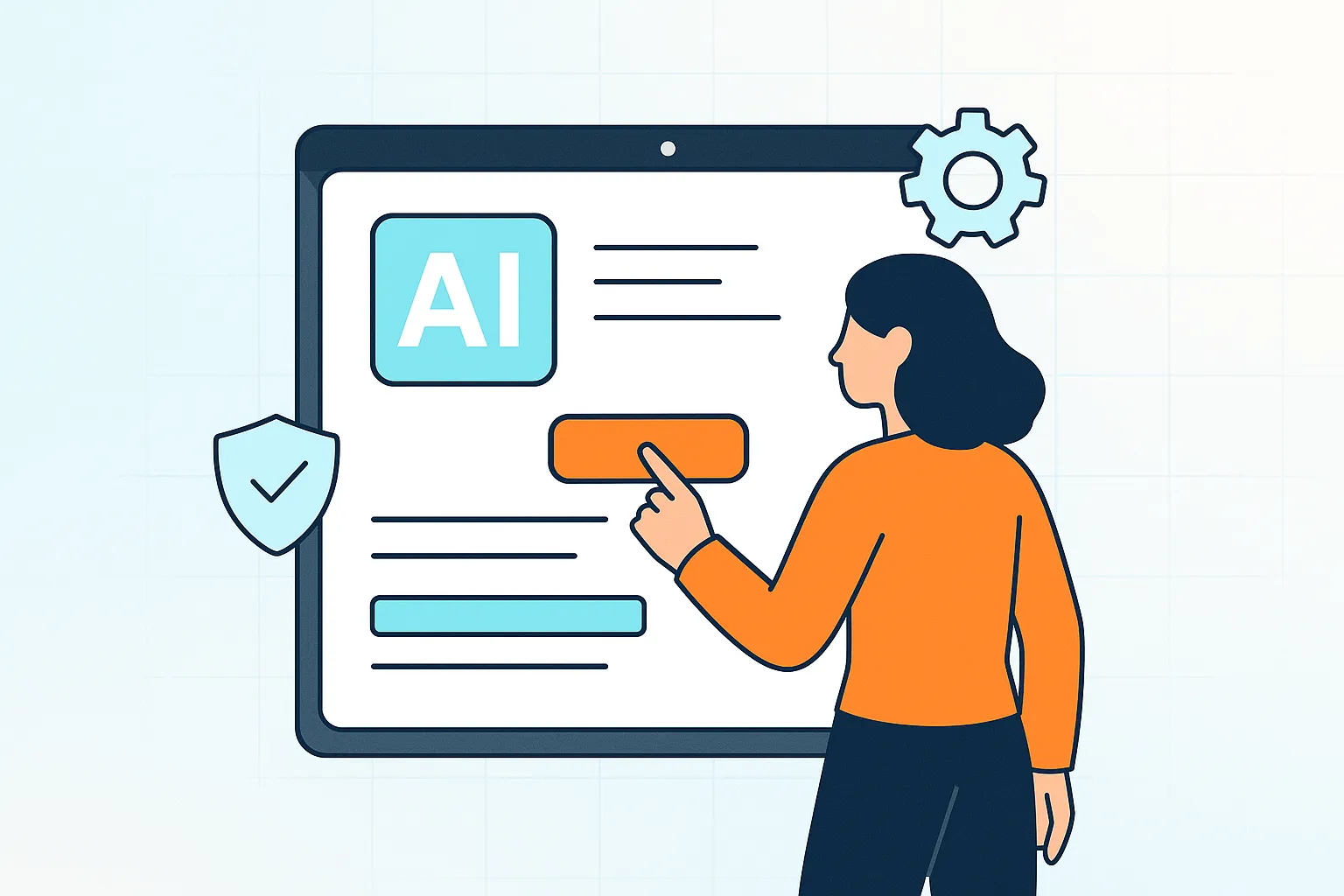The pressure on engineering leaders is immense. Executives demand faster innovation and higher productivity, pointing to AI as the silver bullet. Meanwhile, developers are adopting a patchwork of AI tools on their own, creating a chaotic environment of inconsistent practices, potential security vulnerabilities, and unmeasured impact. This ad-hoc approach, born from a fear of falling behind, often leads to wasted resources and negligible returns, a far cry from the transformative growth promised by AI.
Without a structured plan, organizations are simply reacting. They risk falling behind competitors who are strategically integrating AI across their software development lifecycle (SDLC). The solution isn’t to ban AI tools or let chaos reign. The solution is to build a comprehensive AI governance framework. A well-designed framework provides the essential guardrails for tool selection, usage, and monitoring, turning haphazard experimentation into a strategic advantage. It ensures that every AI initiative is secure, compliant, ethical, and aligned with core business objectives, ultimately unlocking the full potential of AI to drive innovation and achieve sustainable growth.
The Critical Need for AI Governance in Engineering
In today’s rapidly changing marketplace, the directive to “use more AI” is coming from the top down. This executive pressure, combined with the groundswell of developer enthusiasm, creates a perfect storm for ungoverned AI adoption. While this initial excitement can spark innovation, it also introduces significant risks that can undermine progress and expose the business to serious liabilities.
Collaboration with AI development firms permits organizations to focus more intently on core business objectives, which boosts overall productivity. However, without a framework, teams often struggle to translate AI adoption into tangible results. Developers might use different tools for similar tasks, making it impossible to standardize workflows or measure productivity gains consistently. Some engineers may become highly proficient, while others lag, creating knowledge silos and uneven performance across the team. This lack of a unified strategy means that instead of economizing on resources, you may be increasing costs through redundant tool subscriptions and inefficient processes.
More concerning are the security and compliance risks. When developers use unvetted AI tools, they may inadvertently feed sensitive or proprietary information into third-party models. This creates a significant risk of data leakage and regulatory non-compliance. Navigating the complexities of regulations like GDPR, CCPA, and HIPAA is challenging enough; doing so with ungoverned AI usage is a recipe for disaster. A seasoned company specializing in AI development can ensure that sensitive data is managed in strict accordance with pertinent regulations, but this requires a formal governance structure.
An AI governance framework addresses these challenges head-on. It provides the clarity and structure needed to move from a reactive, experimental phase to an intentional, strategic approach. By establishing clear guidelines, you empower your teams to innovate safely, measure impact accurately, and align their efforts with broader business goals. This is how you gain a competitive edge, streamline operations, and ensure that your investment in AI yields significant long-term benefits.
Core Pillars of a Robust AI Governance Framework
A comprehensive AI governance framework is not a single document but a living system of policies, processes, and controls. It should be designed to be both robust and adaptable, providing clear direction while allowing for flexibility as AI technologies evolve. Here are the essential pillars every engineering organization should consider.
Pillar 1: AI Tool Selection and Usage Policies
The foundation of any governance framework is a clear policy on which AI tools are approved and how they should be used. This prevents the “Wild West” scenario where every developer uses a different tool, leading to security risks, budget inefficiencies, and inconsistent outputs.
- Vetting and Approval Process: Establish a formal process for evaluating and approving AI tools. This should involve stakeholders from engineering, security, legal, and finance. The assessment should gauge a tool’s proficiency, verify its technical skills and experience through its project history, and ensure it aligns with your business needs.
- Standardized Toolset: While allowing for some flexibility, aim to standardize on a core set of AI tools for common tasks like code generation, testing, and documentation. This simplifies training, improves collaboration, and allows for better negotiation of enterprise licenses.
- Clear Usage Guidelines: For each approved tool, provide clear guidelines on its intended use cases. For example, specify whether a tool is approved for generating boilerplate code, refactoring existing logic, or writing documentation. These guidelines help ensure that AI is used effectively and for the right tasks.
- Ethical Principles: Your usage policies must be grounded in core ethical principles like transparency, fairness, accountability, and inclusivity. This involves emphasising adherence to ethical guidelines to promote responsible development within AI technology sectors. This focus helps preserve confidence in artificial intelligence among users and stakeholders alike.
Pillar 2: Data Governance, Security, and Compliance
When engineering teams use AI, they are often interacting with sensitive data, including proprietary code, customer information, and strategic plans. A critical function of AI governance is to protect this data.
- Data Classification: Define what constitutes sensitive or proprietary information and establish clear rules about what data can and cannot be used with external AI models.
- Regulatory Compliance: AI consulting services play a crucial role in ensuring compliance. The framework must address key regulations:
- GDPR: Guide your organization through its complexities to guarantee the appropriate management of personal information.
- CCPA/CPRA: Craft bespoke strategies that align with compliance demands and confirm that your company maintains conformity with data privacy legislations.
- HIPAA: For those in healthcare, offer expertise to aid in meeting benchmarks for patient data protection.
- Security Protocols: Ensure that all AI tool usage adheres to your company’s security protocols. This includes managing access controls, monitoring for suspicious activity, and ensuring that any cloud-based AI solutions are configured securely. Collaborating with a seasoned AI development partner ensures that sensitive information is managed in strict accordance with these regulations.
Pillar 3: Monitoring, Optimization, and Support
A governance framework is not a “set it and forget it” initiative. It requires continuous oversight to ensure its effectiveness and to adapt to new technologies and business requirements.
- Performance Monitoring: Establish key performance indicators (KPIs) to measure the impact of AI tools on engineering productivity. Track metrics like deployment frequency, code review time, and bug resolution rates. This vigilant monitoring and improvement of AI performance helps boost efficiency and sustain a competitive advantage.
- Continuous Optimization: Use the data from monitoring to refine your AI strategy. Services offered by AI consulting include continuous oversight and improvement of AI solutions to preserve their operational performance. External AI firms continually refine their AI models, giving your business access to the latest technology.
- Ongoing Support: Ensure that your selected AI partner offers persistent support and upkeep. This is crucial for maximizing system efficacy as time progresses. Enduring assistance is essential for the creation and preservation of AI models to cater to evolving technological advancements and business requirements.
Pillar 4: Training and Workforce Readiness
The successful adoption of AI is as much about people as it is about technology. Your framework must include a plan for equipping your team with the necessary knowledge and skills.
- Role-Based Training: Develop tailored training initiatives to strengthen the capabilities of your teams. Continuous training from an AI partner plays a vital role in equipping clients with the necessary knowledge and skills for AI, enabling them to proficiently manage and utilize new systems.
- Best Practices: Go beyond basic tool training to instill a deeper understanding of how to work with AI effectively. This includes prompt engineering, critically evaluating AI-generated code, and understanding the limitations of different models.
- Fostering an AI-First Culture: Artificial intelligence consulting and development services focus on workforce readiness to drive transformative growth. The goal is to move beyond mere tool adoption to a culture where AI is a natural and integrated part of the engineering workflow.
How an AI Development Partner Accelerates Governance
Building and implementing a comprehensive AI governance framework is a complex undertaking. It requires a unique blend of technical expertise, strategic foresight, and an in-depth understanding of the regulatory landscape. This is where partnering with a specialized AI development agency like MetaCTO becomes a strategic move that can yield significant long-term benefits.
At MetaCTO, we bring over 20 years of experience and have launched more than 100 applications, giving us the sophisticated insights needed to guide organizations through the complexities of AI adoption. We don’t just build AI-powered apps; we provide the strategic guidance necessary to ensure that your AI initiatives are successful, secure, and scalable.
Partnering with an AI development company saves businesses time and resources compared to building an in-house team from scratch. Instead of spending months sourcing staff and funding ongoing training programs, you get immediate entry into elite-level knowledge. Our teams of AI experts contribute extensive experience, ensuring that your governance framework is not only compliant but also at the forefront of industry best practices. We help you navigate the complexities of AI adoption and ensure successful implementation from initial planning to ongoing optimization.
Our approach is comprehensive and tailored to your unique business requirements.
- Strategic Guidance: We work closely with you to develop customized AI strategies that align with your specific goals and challenges. This includes defining a project’s scope and initial data requirements to ensure tailored AI solutions.
- Compliance and Security: We provide advisory, strategy, and governance support crucial for ensuring compliance and security in AI development. Our experts guide organizations through the complexities of regulations like GDPR, CCPA, and HIPAA, ensuring sensitive information is managed appropriately.
- Scalable Solutions: We provide scalable solutions that are crucial as your business grows. We often deliver cloud-based AI solutions that can adjust to expanding business requirements, allowing you to start with small implementations and gradually expand your AI capabilities without a significant initial investment.
- Continuous Improvement: We provide continuous optimization and support to maintain the effectiveness of your AI solutions over time. This includes persistent support and upkeep, which is crucial for maximizing system efficacy as time progresses.
To help organizations formalize their approach, we developed the AI-Enabled Engineering Maturity Index (AEMI). This framework provides a clear roadmap for assessing your current AI capabilities and identifying the concrete steps needed to advance from a reactive or experimental stage to a strategic, AI-first organization. Furthermore, our upcoming 2025 AI-Enablement Benchmark Report offers data-driven insights from hundreds of engineering teams, allowing you to benchmark your progress against the industry’s best. Choosing a comprehensive partner like MetaCTO ensures you have access to the necessary resources and expertise for AI success.
Conclusion: From Reactive Chaos to Strategic Advantage
In the race to adopt artificial intelligence, the greatest risk is not falling behind—it’s moving forward without a plan. An ad-hoc, ungoverned approach to AI in engineering introduces security vulnerabilities, compliance nightmares, and wasted resources, ultimately failing to deliver the promised productivity gains. A robust AI governance framework transforms this chaos into a powerful strategic advantage, providing the essential structure to innovate safely, efficiently, and effectively.
Throughout this guide, we’ve outlined the critical need for governance and detailed its core pillars: clear policies for tool selection and usage; rigorous data governance and security protocols; a commitment to continuous monitoring and optimization; and a focus on workforce training and readiness. Building this framework ensures that every AI initiative is aligned with your business objectives, mitigates risk, and maximizes your return on investment.
You don’t have to navigate this complex journey alone. Partnering with an experienced AI development company like MetaCTO provides the expert guidance needed to build and implement a governance framework tailored to your specific needs. We help you move from a reactive state to a position of strategic strength, unlocking the full potential of AI to drive transformative growth and secure a lasting competitive edge.
If you’re ready to bring order to your AI adoption strategy and ensure your engineering teams are poised for sustained success, talk with an AI app development expert at MetaCTO today.

